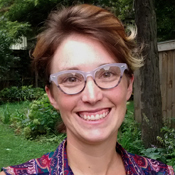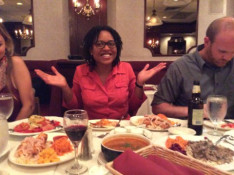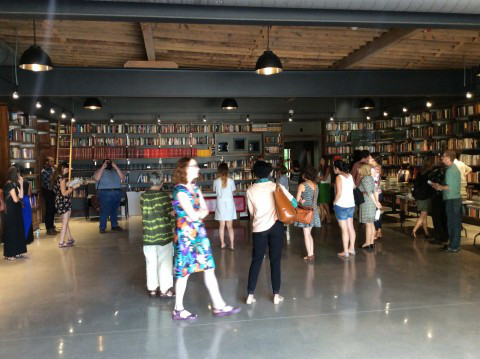
 Expanding their sense of how they might use their training as humanities scholars, Erica Damman (Environmental Humanities, CLAS; left) and Noaquia Callahan (History, CLAS; right) participated in the first cohort of the Alternative Academic Career Workshop for Pre-Doctoral Students in the Humanities. The three-week workshop in Chicago was sponsored by Humanities Without Walls (HWW) in collaboration with the Chicago Humanities Festival. HWW is a consortium of humanities centers and institutes from 15 major research universities throughout the Midwest led by Antoinette Burton, Professor and Director of the Illinois Program for Research in the Humanities at the University of Illinois at Urbana–Champaign (UIUC).
Expanding their sense of how they might use their training as humanities scholars, Erica Damman (Environmental Humanities, CLAS; left) and Noaquia Callahan (History, CLAS; right) participated in the first cohort of the Alternative Academic Career Workshop for Pre-Doctoral Students in the Humanities. The three-week workshop in Chicago was sponsored by Humanities Without Walls (HWW) in collaboration with the Chicago Humanities Festival. HWW is a consortium of humanities centers and institutes from 15 major research universities throughout the Midwest led by Antoinette Burton, Professor and Director of the Illinois Program for Research in the Humanities at the University of Illinois at Urbana–Champaign (UIUC).
Chicago as Backdrop and Playground for Alt-Ac Exploration
Damman and Callahan, along with 28 other fellows—two from each consortium university—visited museums, libraries, hybrid cultural sites, a design thinking lab, and an internationally acclaimed advertising agency. They held extensive conversations about career paths with curators, editors, entrepreneurs, artists, consultants, event organizers, and recently graduated PhD recipients.
The Expansive Humanities PhD
“Never before have I thought of how expansive the humanities PhD and my skill set could be,” says Damman. Both she and Callahan are previous Obermann Graduate Institute Fellows, and Damman says that the HWW Workshop reminded her of the Institute in that once again she was “in the company of brilliant, kind people whose compass is set toward social impact and a more imaginative, inclusive view of the world.” (To gain some sense of Damman’s workshop experience, take a look at her blog posts from last summer, including one in which she wrote,
“I sat there and realized that the HWW workshop would be the beginning of a radical redefinition of myself, how I self-identify, and how I project my expertise outside the academy.”)
Transferable Skills
Callahan, who spent the 2015–16 academic year as a Doctoral Fellow in African American History at the German Historical Institute in Washington, DC, and recently won a Fulbright Award, agrees that the workshop exposed her to a variety of careers both inside and outside the academy. It also helped her to better understand how to venture outside the academy: “While I’ve always been interested in exploring my career options beyond the academy, figuring out how was a constant frustration. Through a series of presentations, group exercises, and informational interviews, HWW equipped me with the tools necessary to use networking, resume writing, and social media to be successful on the job market. Of equal importance, I learned how my work as a doctoral student in history, as a researcher, and as a community service organizer has cultivated a transferable skill set that is desirable to a wide range of employers.”
Callahan hopes to work in the world of foundations or with the U.S. State Department, while Damman is pursuing options that include forming or working for an environmental consultancy group, coordinating environmental efforts at the city level, and being an independent artist/writer. As she weighs options, Damman says,
The workshop taught me how to take ownership of my multi-hyphenated interests. Reframing is not just a way of adopting the language of an outside world or translating my academic skills, but recognizing the value and need for people who think from a humanist viewpoint…. I do not exaggerate when I say this was a life-changing experience!
The summer 2017 Humanities Without Walls graduate summer program is open to any graduate student in the United States. (The summer 2018 program will be open only to graduate students at HWW consortium schools.) To learn about the application process for 2017, see our website.
